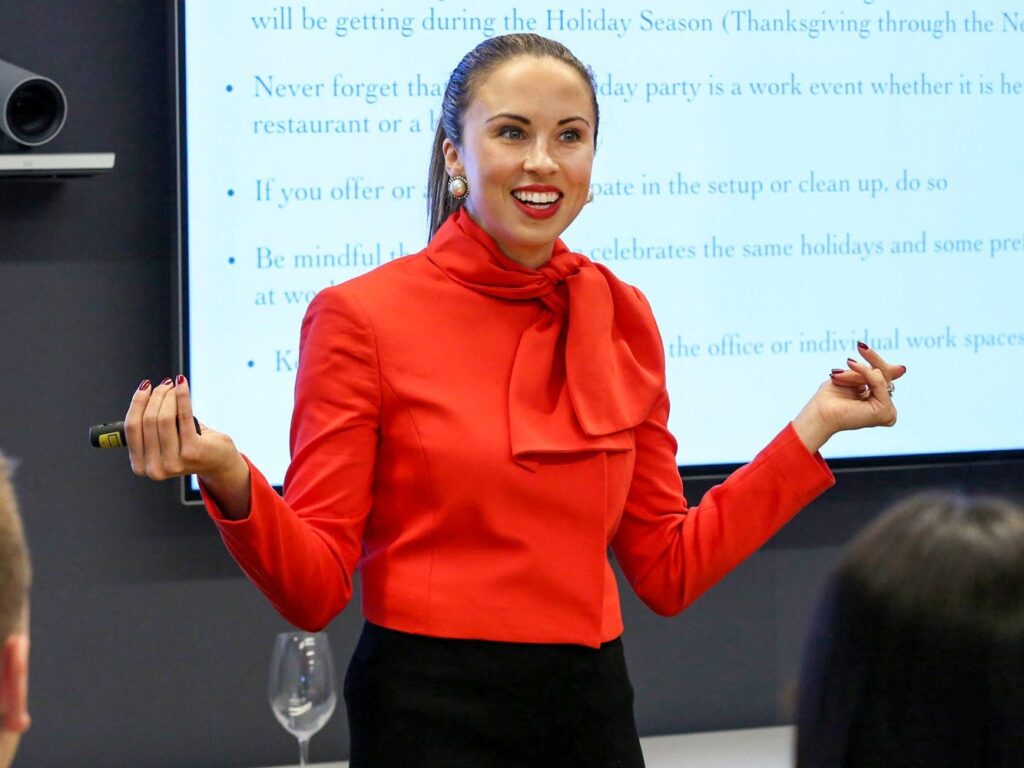- Workers are struggling with office etiquette after working remotely for the past few years.
- Business Insider spoke to the founder of an etiquette firm that offers courses in business etiquette.
- She said common mistakes in the office include speaking loudly or eating smelly foods for lunch.
As more companies issue return-to-office mandates, it's opened up discussions around people lacking office etiquette — from what they eat in the office to how they converse with colleagues.
The COVID-19 pandemic gave rise to remote work, which meant people became accustomed to communicating via video calls, wearing pajamas while working, and eating whatever they wanted.
But now they're being ordered to return to the office, and they don't know how to conduct themselves with offenses ranging from wearing inappropriate attire to eating smelly foods for lunch.
Myka Meier runs US-based firm Beaumont Etiquette, which offers etiquette courses for companies and individuals to learn soft skills like communication, dining etiquette, and how to dress for work, among other things.
Her clients range from retail sales teams to colleges, startups, banks, and Fortune 100 companies — and courses cost $350 for an hour-long session for individuals and upward of $2,500 for corporate group sessions.
Meier told Business Insider she saw an uptick in interest in these courses after the pandemic.
"We started seeing a bigger uptake of people saying: 'What are the new office rules of post-COVID? Are we allowed to talk to each other? Are we allowed to talk at the water cooler?'" she said.

She said many workers lost the art of communicating in person while working from home.
"There were two very specific years where we didn't have face-to-face communication, and it was Zoom etiquette suddenly, and then people were having their dog walk behind them and eating on a call," she said.
Now that they're back in the office, some of the most common office mistakes she has seen include speaking loudly on the phone, sending emails to colleagues a few desks away to avoid speaking to them in person, and eating smelly foods for lunch.
Meier offered an example of a lunch and learn where she might teach a group of employees the correct dining etiquette for a formal meal.
"I'm teaching them from the moment you sit down when you put your napkin in your lap, all the way to what you do with that napkin when you get up to leave and everything in between.
"Ordering wine, paying the bill, holding silverware, holding glassware, everything. Who starts first, who finishes first," she said.
Gen Z is struggling with communication skills

Another concern for companies is Gen Zers who have just entered the workforce and are uneducated on how to behave in an office environment.
Major consulting firms, including KPMG, Deloitte, and PWC, have said that some of their newest Gen Z recruits are struggling to pick up basic communications skills after studying virtually during college.
These skills include presenting in person, collaborating with team members in the office, or maintaining eye contact.
"Gen Z is used to communicating virtually … when you're thrust into a new position or job, and that's not how you communicate, it's jarring for a generation that didn't grow up like that," Meier said.
She explained that some younger workers need coaching on how to hold eye contact, introduce themselves to people, and start conversations in a group.
She advises young professionals to seek out etiquette training for themselves, including from books.
"I didn't grow up with etiquette, and I took it upon myself to educate myself when I realized that there was an issue and I didn't know certain protocols and people were reacting badly to me," she said.
"You have to educate yourself — all etiquette is, is being kind and respectful to other people and putting others first."
She added: "You could be the smartest person in the room, but if your EQ is not up to par, then you probably still have a lot to work on."

